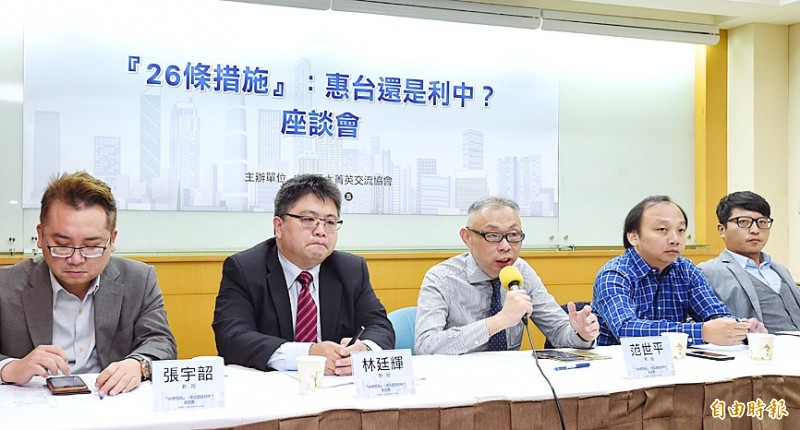《TAIPEI TIMES》 Measures undermine Taiwan: forum

From left, Cross-Strait Policy Association researcher Chang Yu-Shau, Taiwan Society of International Law deputy secretary-general Lin Ting-hui, National Taiwan Normal University politics professor Fan Shih-ping, Taipei University of Marine Technology assistant professor Wu Chien-chung and Taipei University of Marine Technology assistant professor Wu Se-chih attend a forum on China’s 26 new measures for Taiwanese in Taipei yesterday. Photo: Liu Hsin-de, Taipei Times
‘EMPTY TALK’: Experts said that Beijing’s 26 new policies aim to undercut Taiwan’s influence and retain Taiwanese capital in China in the face of economic headwinds
By Chung Li-hua / Staff reporter
Beijing’s 26 new measures for Taiwanese betray its attempts to impose a “one country, one system” framework on Taiwan and attract the nation’s businesses, at a time when the Chinese economy is declining, policy experts told a forum in Taipei yesterday.
The Asia-Pacific Elite Interchange Association held the forum to analyze the advantages and disadvantages of the measures unveiled by China’s Taiwan Affairs Office on Monday.
As many of the measures are related to residence permits, they might be more pertinent to Taiwanese working in China, Taiwan Society of International Law deputy secretary-general Lin Ting-hui (林廷輝) said.
Regarding the 14th measure, which provides overseas Taiwanese with consular assistance from Chinese embassies, Lin said that the offer is “empty talk,” as it means Beijing would not help Taiwanese seek compensation via diplomatic channels if their rights are infringed upon in other nations.
By doing so, China is attempting to hollow out the power of Taiwan’s embassies and its consular rights in countries without formal ties, he said.
However, holders Republic of China passports who seek consular assistance from Chinese embassies might encounter trouble, especially as the US and other countries have increasingly cautioned against working with China, he added.
As for emergency aid, Taiwan’s embassies offer financial assistance to Taiwanese in urgent need and requires them to guarantee that they would pay it back after returning to Taiwan, but China requires their family to remit payment before it offers aid, Lin said.
Taiwanese should have the wisdom to judge which aid program is more convenient, he added.
China’s measures are flawed for trying to couple political propaganda with psychological warfare, linking the measures to residence permits and lacking supplementary policies, Taipei University of Marine Technology assistant professor Wu Chien-chung (吳建忠) said.
Despite Beijing’s claim that Taiwanese teachers and students may apply for Chinese government funding to study overseas, the China Scholarship Council last year stopped the funding plan for students in master’s programs, he said.
Fifteen measures target Taiwanese businesspeople, but most are extensions of last year’s 31 measures, although with more concrete goals, Studies on Chinese Communism monthly researcher Wu Se-chih (吳瑟致) said.
As Taiwanese investment in China is declining, the 26 new measures are actually attempts to keep Taiwanese capital in China to help with its domestic development, he said.
The 26 measures were introduced at a time when China faces weakening exports, inflation and losses of capital, expertise and talent, as well as the withdrawal of foreign and Taiwanese investors, due to a trade dispute with the US, Cross-Strait Policy Association researcher Chang Yu-shao (張宇韶) said.
China needs Taiwan’s core industries and circular economy techniques, rather than primary or secondary industries, but Taiwanese firms might face US sanctions if they participate in the development of China’s 5G infrastructure, he said.
The Taiwanese government should improve the domestic investment environment and related policies to prevent vital businesses — such as chipmaker Taiwan Semiconductor Manufacturing Co — from focusing their production in China, he added.
Additional reporting by CNA
新聞來源:TAIPEI TIMES



















